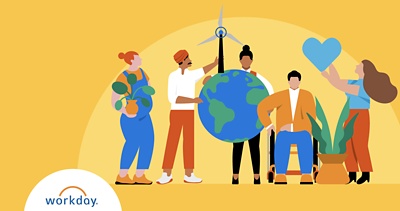Last but certainly not least, we knew our community members where we lived and worked were struggling. Wemade cash donationsthrough the Workday Foundation to organizations supporting the front lines of the COVID-19 crisis. We alsoexpedited grantsfrom the Workday Foundation to our existing nonprofit partners that suddenly found themselves helping an influx of new job seekers whose employment had been impacted by the pandemic. As I look back at the actions we took, I’m proud that we’re still focused on ensuring our global society equitably recovers from the pandemic. I’m hopeful that we can close the opportunity gap together with organizations that share in our vision.
While we’ve always been steadfast in our belonging and diversity efforts, we accelerated our commitments to equity because we knew we needed to do more. Fostering a diverse workforce has always been important for us. In the last year, we saw a rise in senseless acts of violence against communities of color, particularly against our Black and Asian American and Pacific Islander communities. The social justice movement made it clearer than ever that we have a responsibility to step up our own actions to create equity for all within the workplace and our communities.
Rooted in a strategy called VIBE™, which stands for Value Inclusion, Belonging, and Equity, we identified a core set ofcompany commitmentsthat help us hire and develop diverse talent, cultivate a culture of belonging, build inclusive products and technology, and strengthen our communities. In 2020, we established our first-ever VIBE Accelerator Team, a cross-functional group of more than 20 employees devoted to helping us achieve greater belonging and diversity for our workplace, our customers, and our communities. And finally, we donated $12 million to organizations addressing social injustice and racism.
With an accelerating climate crisis fast approaching, we realized we needed to take big actions for a more sustainable future. If we don’t act with urgency now, climate change will undeniably have long-lasting consequences not only for our Earth, but also for its people, economy, and society at large. To further our commitment to sustainability, we’ve supported a number of initiatives these past two fiscal years.
In 2020, we reached our goal of achieving net-zero carbon emissions a year early, while operating on 100% renewable electricity. In early 2021,we committedto set science-based emissions reduction targets—across the entire value chain—that are consistent with keeping global warming to 1.5 degrees Celsius. We mitigated our historical emissions to achieve a lifetime net-zero carbon footprint, and we invested $1 million in carbon removal projects. As with many of the world’s toughest challenges, it takes a village to make an impact, which is why collaboration is so imperative—especially when we look to addressing the climate crisis. With this in mind, we’re continuing tocollaborate with organizationsto maximize the positive impact we can collectively have on the planet.
A widening opportunity gap and increased barriers to employment for talented individuals taught us the value of collaboration for good. The events of this past year have only widened the opportunity gap, exposing vast inequities in the workforce ecosystem. ThroughOpportunity Onramps®, our movement dedicated to creating economic opportunity for all, we expanded our commitment to job seekers experiencing barriers to thriving-wage careers.
We’ve pledged to fill 20% of our early to mid-career roles at Workday with Opportunity Onramps candidates by 2023, and as a company, we’re committed todonating 250,000 volunteer hoursto organizations helping to close the opportunity gap. As we look ahead, we’re continuing to support major employment initiatives like theBay Area Opportunity Onramps Collaborativewith partner organizations—like JFF, JVS, Opportunity@Work, and SkillUp—that share in our mission to close the opportunity gap.
Reflecting on these past two years, especially what we’ve all gone through in 2020, we’ve learned that we really are a more connected global society than we ever imagined. We’ve made great strides, and we’re invigorated by the opportunities ahead to continue to make progress in these areas and more. There’s much to be done to inspire a brighter work day and future for all, but we’re looking forward to working together to accomplish our goals.
Interested in learning more? See ourWorkday 2021 Global Impact Report.






